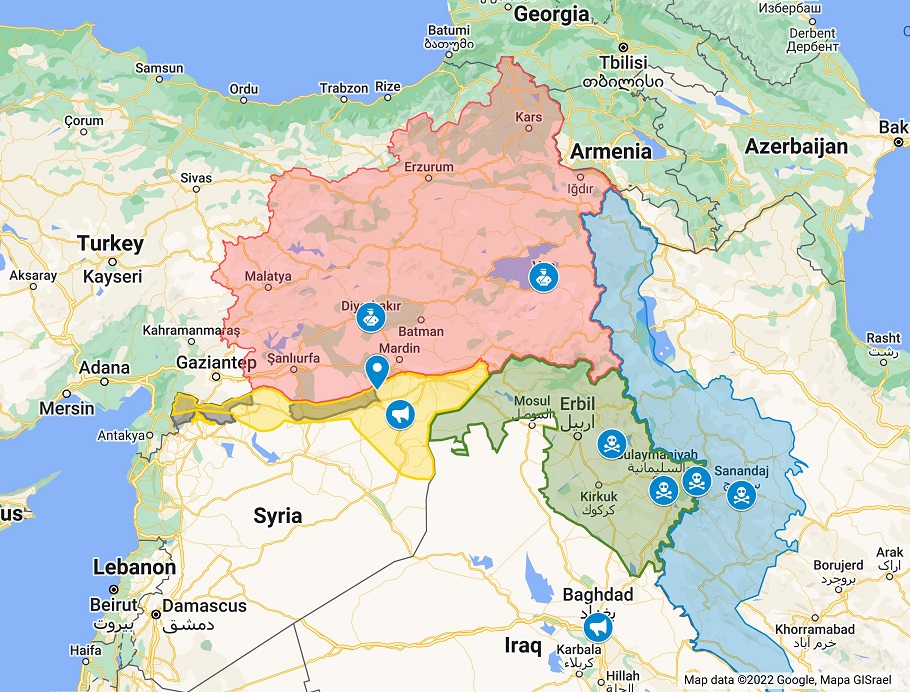1.5K
A weekly brief of events occurred in the Kurdistan regions of Iran, Iraq, Syria, and Turkey.
Iran
- Anti-regime protests continued for their ninth week across Iran, including the Kurdistan Region. Though numbers could be higher, rights groups revealed the names of at least 326 killed by the security forces. Among the victims were 57 Kurds, including eight minors and five women. The Iranian authorities used force to end the new wave of protests in Marivan last week, wounding at least 50 people and arresting dozens. On Monday, a Kurdish man named Hamid Guli, beaten by the police days ago, lost his life in Tehran. His family was banned from holding a public funeral in Sanandaj (Sena). Likewise, the security forces killed two protesters, Saman Rahmani in Tehran, and Ardalan Qasimi in Kermanshah, for writing anti-regime slogans. The authorities also kidnapped several civilian activists, Qadir Paknaha and Kiwan Nabi, in Piranshahr. At the same time, 14,000 people remain in Iranian prisons facing long jail times and death sentences, including a Kurdish singer named Saman Yasin, amid calls by the United Nations to halt executions. Last Wednesday, several Kurdish cities held a public strike and closed down shops and businesses. Moreover, on Monday, the European Union imposed new sanctions against three Iranian organizations and 29 government officials, including the minister of interior Ahmad Vahidi. French President Emmanuel Macron vowed more sanctions for a crackdown on peaceful protests. In the US, the Federal Investigations Bureau (FBI) revealed that Iran and China are hiring private detectives to monitor dissidents.
Iraq
- On Monday, the Islamic Revolutionary Guards Corps (IRGC) launched a new wave of attacks on Iranian Kurdish parties in Iraqi Kurdistan. Several missiles and drones bombed the headquarters of the Democratic Party of Iranian Kurdistan (KDPI) in Koya and the Komal party in Sulaymaniyah’s Zargwez subdistrict. The attacks killed two KDPI members and wounded six people in Koya. The Kurdistan Regional Government (KRG), Iraq’s Foreign Ministry, the United Nations, the US, the UK, and several other countries denounced the attacks. The IRGC vowed to continue attacking the opposition groups. The Iranian Kurdish opposition repeatedly denied physical involvement in the ongoing protests inside Iran but supported it via statements. The exiled Cooperation Center for Iranian Kurdistan’s Political Parties (CCIKP) called for a general strike across Kurdistan on November 17, marking the third month of the anti-government demonstrations. The IRGC also bombed several locations near the Bradost region with artillery. The IRGC killed 24 Iranian Kurds on September 28, targeting three areas of the Kurdish opposition.
- In a press conference, the new Iraqi Prime Minister, Mohammed Shia’ Al Sudani, vowed to solve the issues with the Kurdistan Region, including adopting a new oil and gas law and the budget of the Kurdistan region. “Our discussions with the Ministry of Oil continue to prepare the oil and gas bill. And with the Kurdistan Region, there will be preliminary discussions on the bill before being presented to the Council of Ministers and then sent to parliament,” al Sudani told Rudaw.
Turkey
- On Sunday afternoon, a bomb killed six people and wounded 81 in Istanbul’s crowded Istiklal street. The Turkish authorities detained a suspect woman hours after the bombing, accusing her of ties to the Kurdistan Workers’ Party (PKK). The Turkish minister of interior, Suleyman Soylu, said the suspect received her phone from Kobane and entered Turkey from Afrin. Soon after Soyl’s allegations, the PKK denied involvement, and its umbrella organization, the Kurdistan Democratic Communities Union, accused the Turkish ruling parties of “hiding the truth” and “creating the necessary conditions for them to carry out their malicious plans.” Likewise, the Syrian Democratic Forces (SDF) commander Mazloum Abdi rejected the Turkish allegations and expressed condolences to the families and the Turkish people. Several experts and political observers doubted the story of the Turkish government of the bombing. On Tuesday, November 15, the Turkish police investigated an ultra-nationalist official, a member of the Nationalist Movement Party (MHP), after phone records of calls between him and the suspect.
- In a recent ruling, the European Court of Human Rights ruled to release the thirteen jailed lawmakers of the Peoples’ Democratic Party (HDP). Previously, the same court also ruled to release the Kurdish politician Selahattin Demirtas and the Turkish philanthropist Osman Kavala. Still, the Turkish government rejected the court’s orders risking Turkey losing Europe’s human rights protections. “The immediate release of our friends who have been unjustly and unlawfully taken hostage until today is a universal law and constitutional obligation before Turkey.” read the statement of the HDP’s Law and Human Rights Commission. Separately, a criminal court in Diyarbakir (Amed) sentenced the former HDP lawmaker Sırrı Süreyya Önder to five months in prison for “publicly insulting the Turkish nation.” Önder was one of the senior HDP lawmakers sacked by the government. In Van, a criminal court sentenced 22 members of the Kurdish Democratic Society Congress (DTK) to six years and three months for each for “membership of a terrorist organization.”
Syria
- The Syrian Democratic Forces (SDF) announced the death of one of its ranks and the injury of three others by Turkish artillery in two villages near Zarkan town. Moreover, Turkey and its Syrian proxies shelled east of Kobane, Tal Tamer, and Tal Rifa’at, wounding one civilian named Mohammed Shibli.
- The new Swedish prime minister visited Ankara and vowed to counter “terrorism” threats to Turkey, including crackdowns on Kurdish groups in Sweden. Previously, Swedish Foreign MinisterTobias Billström also said they would “keep their distance” from Syrian Kurds. In response, the Syrian Democratic Council (SDC) expressed concerns about remarks by the Swedish government. “Sweden is not that weak that it is subject to blackmail by Turkey, and it was not forced at this moment to make concessions and weaken democracy and the rule of law to please a dictator with experience throughout the region,” read the SDC statement. Sweden aims to join NATO, but the Turkish veto has prevented it so far.

